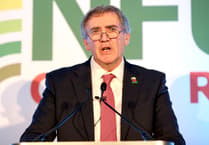An innovative programme to enable supply chains to reward farmers for reducing greenhouse gas emissions is now open to farmers.
Developed by Soil Association Exchange, the new Exchange Market will operate as an insetting fund without any sales of carbon credits. Instead, it will pool funds from a range of companies with shared supply chains to pay farmers to reduce emissions. Support to develop the scheme has been given by Lloyds who have helped to convene key retailers and landowners including the Co-Op, Lidl, Tesco and the Church Commissioners for England to contribute to the fund. The fund has been co-developed with technical experts Finance Earth.
Crucially it has also been devised in close and ongoing collaboration with a farmer steering group and farmers will receive funding for cutting emissions by adopting action plans that work for them. These plans will be led by the farmer and put together with the support of Soil Association Exchange expert advisors and could include actions such as reducing fertiliser usage by introducing nitrogen-fixing companion crops, better fuel efficiency or investing in solar.
Soil Association Exchange Chief Executive Joseph Gridley said: “Exchange Market is about creating real, measurable change within farming systems while empowering farmers to make decisions that work for them.
“This carbon insetting programme demonstrates that delivering true environmental outcomes can go hand in hand with financial resilience when farmers and businesses collaborate to build a sustainable future for food and farming.
“It represents a major step forward in aligning farming activities with climate goals and demonstrates the power of what can happen when businesses and farmers work together. Collaboration like this enables greater scalability, affordability, and ultimately more impact in reducing agricultural emissions and advancing positive environmental outcomes.”
Farmers participating in the scheme can earn £60 per tonne of CO2e (carbon dioxide equivalent) reduced annually, with half of payments provided upfront to help fund their transitions.
Importantly, farmers who are already ahead of the curve will be rewarded, in addition to those who are making new steps to reduce carbon.
Those who have emissions that are below average, according to their Soil Association Exchange benchmark using the Farm Carbon Toolkit, will be eligible for maintenance payments, recognising their progress to date and supporting them to continue their performance.
James Hay, of Barton Place Farms, and member of the farmer steering group, comments “Exchange Market has been created in collaboration with farmers from the start. The result is a fund that offers the flexibility we need to do the right thing for our farm, and provide the financial support for us to try new ways to reduce our emissions. As subsidy funding changes in the UK, schemes like Exchange Market give our business further resilience by offering new income streams from private markets”
In its first funding round Exchange Market has secured £1m in funding, contributed to by businesses united by a commitment to reduce their Scope Three emissions – the indirect emissions generated through their supply chains, or their rental or lending footprints.
Lee Reeves, UK Head of Agriculture at Lloyds said “As the UK’s largest finance provider to agricultural businesses, we play a critical role in supporting the sector in the transition to a more sustainable future. Our support for the Exchange Market as a founding member and lead contributor is an important step. Our ambition focuses on a holistic view of farming’s environmental impact, rewarding farmers in ways that work for them to become more resilient, while also securing long-term profit.”
Farmers can join Exchange Market by completing a baseline assessment and submitting a verified emissions reduction plan – with support from Soil Association Exchange advisors.


.jpeg?width=209&height=140&crop=209:145,smart&quality=75)

